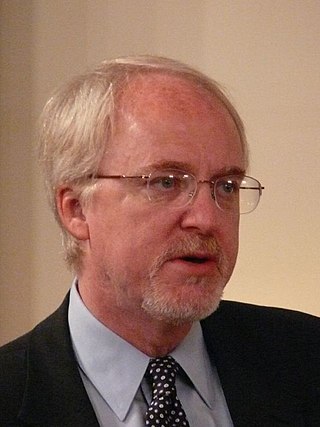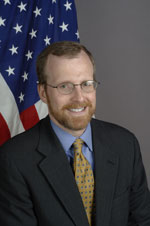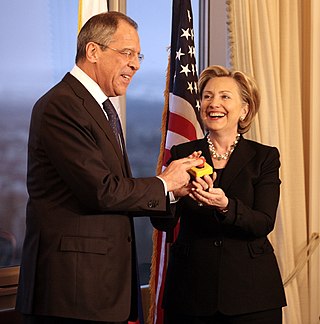
The Human Rights Campaign (HRC) is an American LGBTQ advocacy group. It is the largest LGBTQ political lobbying organization within the United States. Based in Washington, D.C., the organization focuses on protecting and expanding rights for LGBTQ individuals, including advocating for same-sex marriage, anti-discrimination and hate crimes legislation, and HIV/AIDS advocacy. The organization has a number of legislative initiatives as well as supporting resources for LGBTQ individuals.

The Federal Security Service of the Russian Federation (FSB) is the principal security agency of Russia and the main successor agency to the Soviet Union's KGB; its immediate predecessor was the Federal Counterintelligence Service (FSK) which was reorganized into the FSB in 1995. The three major structural successor components of the former KGB that remain administratively independent of the FSB are the Foreign Intelligence Service (SVR), the Federal Protective Service (FSO), and the Main Directorate of Special Programs of the President of the Russian Federation (GUSP).

A smear campaign, also referred to as a smear tactic or simply a smear, is an effort to damage or call into question someone's reputation, by propounding negative propaganda. It makes use of discrediting tactics. It can be applied to individuals or groups. Common targets are public officials, politicians, political candidates, activists, and ex-spouses. The term also applies in other contexts, such as the workplace. The term smear campaign became popular around 1936.

In September 1999, a series of explosions hit four apartment blocks in the Russian cities of Buynaksk, Moscow, and Volgodonsk, killing more than 300, injuring more than 1,000, and spreading a wave of fear across the country. The bombings, together with the Invasion of Dagestan, triggered the Second Chechen War. The handling of the crisis by Vladimir Putin, who was prime minister at the time, boosted his popularity greatly and helped him attain the presidency within a few months.

Russia has consistently been criticized by international organizations and independent domestic media outlets for human rights violations. Some of the most commonly cited violations include deaths in custody, the systemic and widespread use of torture by security forces and prison guards, the existence of hazing rituals within the Russian Army—referred to as dedovshchina —as well as prevalent breaches of children's rights, instances of violence and prejudice against ethnic minorities, and the targeted killings of journalists.

Samantha Jane Power is an Irish-American journalist, diplomat, and government official who is currently serving as the Administrator of the United States Agency for International Development. She previously served as the 28th United States Ambassador to the United Nations from 2013 to 2017. Power is a member of the Democratic Party.

The Middlebury Institute of International Studies at Monterey (MIIS), formerly the Monterey Institute of International Studies, is a graduate institute of Middlebury College, a private college in Middlebury, Vermont. Established in 1955, the school provides instruction on a campus in Monterey, California. The institute offers master's programs and certificates in environmental policy, international policy, language teaching, and translation and interpretation. It is host to several related centers.
The System for Operative Investigative Activities is the technical specification for lawful interception interfaces of telecommunications and telephone networks operating in Russia. The current form of the specification enables the targeted surveillance of both telephone and Internet communications. Initially implemented in 1995 to allow access to surveillance data for the FSB, in subsequent years the access has been widened to other law enforcement agencies.

Andrei Alekseyevich Soldatov is a Russian investigative journalist and Russian security services expert. Together with fellow journalist Irina Borogan he is co-founder and editor of the Agentura.Ru website.

John Ross Beyrle is an American diplomat. A career Foreign Service Officer and specialist in Russian and Eastern European affairs, he served as Ambassador of the United States to the Russian Federation from July 3, 2008, until January 10, 2012, and as Ambassador to Bulgaria from 2005 to 2008.

David J. Kramer was United States Assistant Secretary of State for Democracy, Human Rights, and Labor from 2008 to 2009. He was President of Freedom House from October 2010 to November 2014, and later worked at the McCain Institute. Following a professorship at the Florida International University, he became executive director of the George W. Bush Institute.
Ramazan Yesergepov is a Kazakhstani journalist, whose 2009 arrest led to international concerns about the freedom of the media in Kazakhstan. Prior to his arrest he was the editor of Alma-Ata Info.

Luis C.deBaca is an American lawyer and diplomat who served in the Obama administration as Ambassador-at-Large to Monitor and Combat Trafficking in Persons and as Director of the Department of Justice's Office of Sex Offender Sentencing, Monitoring, Apprehending, Registering, and Tracking.

In Russia, internet censorship is enforced on the basis of several laws and through several mechanisms. Since 2012, Russia maintains a centralized internet blacklist maintained by the Federal Service for Supervision of Communications, Information Technology and Mass Media (Roskomnadzor).

The Russian reset was an attempt by the Obama administration to improve relations between the United States and Russia in 2009–2013.

Tomasz "Tom" P. Malinowski is an American politician and diplomat who was the U.S. representative from New Jersey's 7th congressional district from 2019 to 2023. A Democrat, he served as Assistant Secretary of State for Democracy, Human Rights, and Labor in the Obama administration.

The U.S. Russia Foundation (USRF) is an American non-profit organization founded in 2008 that aims to strengthen relations between the United States and Russia and to promote the development of the private sector in the Russian Federation. While initially established with its headquarters in Moscow, the organization attracted negative attention from the Russian government and relocated to Washington, D.C. in 2015.
Mass surveillance is the pervasive surveillance of an entire or a substantial fraction of a population. Mass surveillance in Russia includes surveillance, open-source intelligence and data mining, lawful interception as well as telecommunications data retention.
The Mikhailov Case refers to an espionage scandal surrounding the activities of the Center of Information Security (CIS) of FSB, whose employees were implicated in high treason after participating in a number of high-profile criminal cases. January 31, 2017 was arrested that the head of the 2nd department of the CIS Sergei Mikhailov (FSB) and his deputy Dmitry Dokuchaev In the same case, the head of the department of investigation of computer incidents of Kaspersky Lab Ruslan Stoyanov and Georgy Fomchenkov were arrested. The men were convicted of giving information to American private sector researcher Kimberly Zenz, but Zenz herself was never charged, and her requests to testify for the defense were ignored.
Sergey Orestovich Beseda is a Russian politician, Colonel General and government agent who headed the Fifth Service of Russia's Federal Security Service (FSB) internal intelligence agency from 2009 to June 2024.















